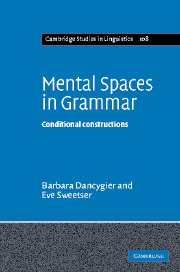Book contents
- Frontmatter
- Contents
- Acknowledgments
- Preface
- Note on abbreviated citations
- The door-scraper in the Wild Wood: an informal lesson in frame metonymy
- 1 Conditional constructions, mental spaces, and semantic compositionality
- 2 Prediction, alternativity, and epistemic stance
- 3 Tense, epistemic distance, and embedded spaces
- 4 Future and present forms in conditional constructions
- 5 Non-alternatives and alternatives: mental spaces in different domains
- 6 Then and even if: mental-space deixis and referential uniqueness
- 7 Clause order and space building: if, because, unless, and except if
- 8 Uniqueness and negative stance: only if and if only
- 9 Coordinate constructions and conditional meaning
- 10 The door-scraper in the Wild Wood: conditional constructions and frame-based space building
- References
- Author index
- Subject index
6 - Then and even if: mental-space deixis and referential uniqueness
Published online by Cambridge University Press: 22 September 2009
- Frontmatter
- Contents
- Acknowledgments
- Preface
- Note on abbreviated citations
- The door-scraper in the Wild Wood: an informal lesson in frame metonymy
- 1 Conditional constructions, mental spaces, and semantic compositionality
- 2 Prediction, alternativity, and epistemic stance
- 3 Tense, epistemic distance, and embedded spaces
- 4 Future and present forms in conditional constructions
- 5 Non-alternatives and alternatives: mental spaces in different domains
- 6 Then and even if: mental-space deixis and referential uniqueness
- 7 Clause order and space building: if, because, unless, and except if
- 8 Uniqueness and negative stance: only if and if only
- 9 Coordinate constructions and conditional meaning
- 10 The door-scraper in the Wild Wood: conditional constructions and frame-based space building
- References
- Author index
- Subject index
Summary
For even if he had stayed with Muriel, then wouldn't Sarah have been left behind?
(AT. AT.310)Does if P, Q really mean the same thing as if P, then Q? If has been regarded as defining the central class of English conditionals. Conditional then often seems to make no readily identifiable independent contribution to the meaning of a predictive conditional; certainly it makes no truth-conditional contribution. Then has consequently been thought of as an optional marker, grammatical rather than meaningful. And yet researchers have noted the absence of then in certain classes of conditionals, such as generics and concessives. In this chapter we present an analysis of conditional then and its interaction with other constructional features of conditionals.
We argue that then makes a compositional meaning contribution to conditional constructions and that its acceptability in a conditional is determined by the compatibility of its meaning with that of the particular construction. Cases of incompatibility can be used to explore both the semantics of then and those of the If P, Q construction. Finally, we will examine ways in which the interaction between then and other constructions can be shaped by the accessibility of content which is not overtly conveyed by the linguistic forms. A clash of constructional semantics can be resolved, it seems, by the availability of added pragmatic interpretive possibilities.
- Type
- Chapter
- Information
- Mental Spaces in GrammarConditional Constructions, pp. 142 - 171Publisher: Cambridge University PressPrint publication year: 2005



